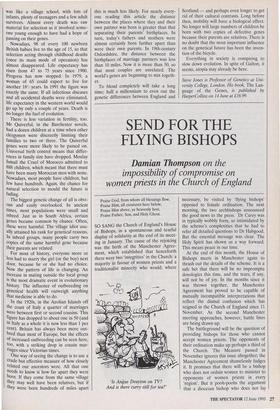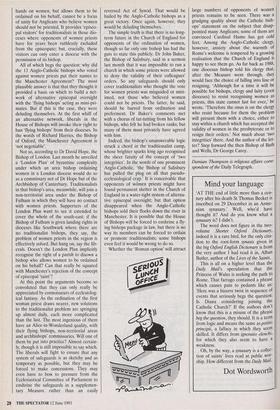SEND FOR THE FLYING BISHOPS
Damian Thompson on the
impossibility of compromise on women priests in the Church of England
Praise God, from whom all blessings flow, Praise Him, all creatures here below, Praise Him above, ye heavenly host, Praise Father, Son, and Holy Ghost.
SO SANG the Church of England's House of Bishops, in a spontaneous and tearful display of solidarity at the end of its meet- ing in January. The cause of the rejoicing was the birth of the Manchester Agree- ment, which established that henceforth there were two 'integrities' in the Church: a majority in favour of women priests and a traditionalist minority who would, where `Is Ankus Deayton on TV? And is there curry still for tea?'
necessary, be visited by 'flying bishops' opposed to female ordination. The next morning, the two archbishops announced the good news to the press. Dr Carey was in typically wobbly form, so intimidated by the scheme's complexities that he had to refer all detailed questions to Dr Habgood. But the essential message was clear. The Holy Spirit has shown us a way forward. This means peace in our time.
At the end of this month, the House of Bishops meets in Manchester again to thrash out the details of the scheme. It is a safe bet that there will be no impromptu doxologies this time, and the tears, if any, will not be of joy. In the months since it was thrown together, the Manchester Agreement has proved to be capable of mutually incompatible interpretations that reflect the dismal confusion which has reigned in the Church of England since 11 November. As the second Manchester meeting approaches, however, battle lines are being drawn up.
The battleground will be the question of providing bishops for those who cannot accept women priests. The opponents of their ordination make up perhaps a third of the Church. The Measure passed in November ignores this issue altogether; the Manchester Agreement shamelessly fudges it. It promises that there will be a bishop who does not ordain women to minister to opponents of women priests in every `region'. But it pooh-poohs the argument that a diocesan bishop who does not lay
hands on women, but allows them to be ordained on his behalf, cannot be a focus of unity for Anglicans who believe women should not be priested. It provides 'episco- pal visitors' for traditionalists in those dio- ceses where opponents of women priests have for years been ruthlessly excluded from the episcopate; but, crucially, these visitors can only enter a diocese with the permission of its bishop.
All of which begs the question: why did the 13 Anglo-Catholic bishops who voted against women priests put their names to the Manchester Agreement? The most plausible answer is that that they thought it provided a basis on which to build a net- work of alternative episcopal oversight with the 'flying bishops' acting as mini-pri- mates. But if this is the case, they were deluding themselves. At the first whiff of an alternative network, liberals in the House of Bishops will invoke their right to ban 'flying bishops' from their dioceses. In the words of Richard Harries, the Bishop of Oxford, the Manchester Agreement is `not negotiable'.
Not so, according to Dr David Hope, the Bishop of London. Last month he unveiled a 'London Plan' of byzantine complexity under which an area bishop ordaining women in a London diocese would do so as a commissary not of Dr Hope but of the Archbishop of Canterbury. Traditionalists in that bishop's area, meanwhile, will join a non-territorial area under the Bishop of Fulham in which they will have no contact with women priests. Supporters of the London Plan want to see it extended to cover the whole of the south-east: if the Bishop of Fulham is given landing rights in dioceses like Southwark where there are no traditionalist bishops, they say, the problem of women priests in the region is effectively solved. But hang on, say the lib- erals. Doesn't the London Plan implicitly recognise the right of a parish to disown a bishop who allows women to be ordained on his behalf? Can that really be squared with Manchester's rejection of the concept of episcopal 'taint'?
At this point the arguments become so convoluted that they can only really be appreciated by connoisseurs of ecclesiolog- ical fantasy. As the ordination of the first woman priest draws nearer, new solutions to the traditionalist problem are springing up almost daily, each more complicated than the last. The most ingenious of them have an Alice-in-Wonderland quality, with their flying bishops, non-territorial areas and archbishops' commissaries. Will one of them be put into practice? Almost certain- ly, though it is still impossible to say which. The liberals will fight to ensure that any system of safeguards is as sketchy and as temporary as possible, but they may be forced to make concessions. They may even have to bow to pressure from the Ecclesiastical Committee of Parliament to enshrine the safeguards in a supplemen- tary Measure rather than an easily reversed Act of Synod. That would be hailed by the Anglo-Catholic bishops as a great victory. Once again, however, they would be deluding themselves.
The simple truth is that there is no long- term future in the Church of England for opponents of the ordination of women, though so far only one bishop has had the guts to state this publicly. Dr John Baker, the Bishop of Salisbury, said in a sermon last month that it was impossible to run a church in which some priests were allowed to deny the validity of their colleagues' orders. So any safeguards should only cover traditionalists who thought the vote for women priests was misguided or mist- imed, not those who believed women could not be priests. The latter, he said, should be barred from ordination and preferment. Dr Baker's comments met with a chorus of tut-tutting from his fellow bishops, who felt he had broken ranks; but many of them must privately have agreed with him.
Indeed, the bishop's unanswerable logic struck a chord in the traditionalist camp, whose brighter sparks long ago recognised the sheer fatuity of the concept of 'two integrities'. In the words of one prominent Anglo-Catholic, 'the Bishop of Salisbury has pulled the plug on all that pseudo- ecclesiological crap.' It is conceivable that opponents of women priests might have found permanent shelter in the Church of England in a water-tight system of alterna- tive episcopal oversight; but that option disappeared when the Anglo-Catholic bishops sold their flocks down the river in Manchester. It is possible that the House of Bishops will be forced to enshrine a fly- ing bishops package in law, but there is no way its members can be forced to ordain or promote traditionalists; some bishops even feel it would be wrong to do so.
Whether the 'Roman option' will attract
large numbers of opponents of women priests remains to be seen. There was a grudging quality about the Catholic bish- ops' statement on the subject that disap- pointed many Anglicans; some of them are convinced Cardinal Hume has got cold feet. Among the Anglo-Catholic clergy, however, anxiety about the warmth of Rome's welcome is tempered by a growing realisation that the Church of England is happy to see them go. As far back as 1988, one diocesan bishop told his clergy that, after the Measure went through, they would face the choice of falling into line or resigning. 'Although for a time it will be possible for bishops, clergy and laity (even dioceses) to resist recognising women as priests, this state cannot last for ever,' he wrote. 'Therefore the onus is on the clergy who resist because for them the problem will present them with a choice, either to stay within a church which has accepted the validity of women in the presbyterate or to resign their orders.' Not much about 'two integrities' there. And the author of the let- ter? Step forward the then Bishop of Bath and Wells, Dr George Carey.
Damian Thompson is religious affairs corre- spondent of the Daily Telegraph.



































































 Previous page
Previous page